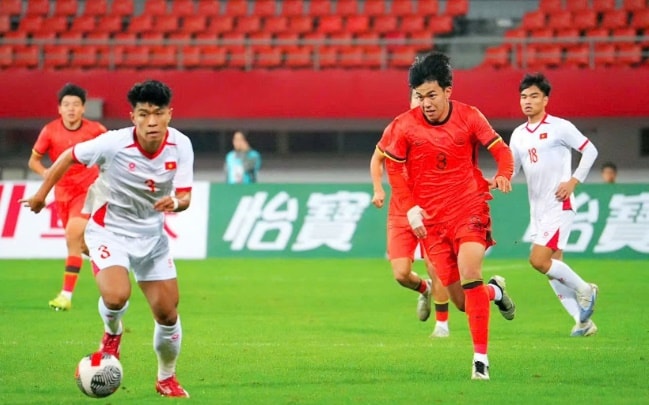U22 Vietnam beat U22 China, revealing many problems
Despite defeating U22 China at the Panda Cup, U22 Vietnam still revealed flaws: clean sheet with Cao Van Binh's mark, defense lacking connection, attack lacking ideas; Coach Kim Sang Sik still has a lot of work to do before the U23 Asia qualifiers.
Away from home at the Panda Cup, U22 Vietnam beat U22 China and kept a clean sheet. But behind that favorable score was an incomplete picture: the goal held firm thanks to the miraculous saves of goalkeeper Cao Van Binh, while the defense and attack systems both revealed many cracks that coach Kim Sang Sik needed to urgently address before the U23 Asian qualifiers.

Key highlight: clean sheet with Cao Van Binh's signature
Vietnam U22 did not concede a goal, but this was more the result of Cao Van Binh's individuality than the product of a solid defensive structure. China U22 were not too dominant, but still created at least two clear scoring opportunities. If not for some incredible saves, the outcome could have gone in a different direction.
Defensive system: gaps and lack of synchronization
The problems that had been budding from previous tournaments were exposed when facing better quality opponents. The lack of connection between the central defenders caused U22 Vietnam to repeatedly expose dangerous gaps right in front of the 16m50 area. Not only that, situations of losing the ball close to the penalty area and the lack of tight marking ability pushed the defense into a passive position.
This is not just a personal story but an organizational problem: formation distance, cover principles and concentrated drop points. When the links do not "lock" the inner and outer corridors, the distance between the lines is stretched, and the opponent can easily exploit the defensive axilities.
Attack: 8-match scoring streak fails to cover stalemate
U22 Vietnam has scored in 8 consecutive official matches - an impressive number. However, against U22 China, if excluding the quick counter-attacks from Vi Hao's individual efforts, the team only created one or two really sharp combinations.
The problem lies in the slow speed of movement without the ball and the scarcity of breakthrough passes. When the opponent retreated deep, U22 Vietnam often passed the ball across the half of the field but was confused by the dense defense, then forced to pass back. Lacking the tactics to stretch the defense, the attacks often "died" at the decisive moment.

Work awaits coach Kim Sang Sik before the U23 Asian qualifiers
The victory has moral value, but the amount of work left is huge. First of all, stabilizing the defensive structure: increasing the connection between the central defenders, limiting dangerous ball losses in front of the penalty area and tightening the discipline according to the man. In parallel, the attacking style needs more ideas to solve the low defensive block: increasing the speed of movement without the ball, improving the coordination in the wings and increasing the frequency of breakthrough passes.
The Panda Cup showed that U22 Vietnam has a strong spirit and individuals who can make a difference, but to compete in a more demanding playground, the team needs a clear operating framework. Fortunately, there is still time for coach Kim Sang Sik to adjust, strengthen the weak links and build a more systematic and effective playing style.
Signals and challenges
- Positive signs: away win, clean sheet, excellent goalkeeper performance.
- Obvious challenges: defensive gaps, lack of ideas in organizing attacks when facing low defensive blocks.
- Urgent requirements: increase system connectivity and improve final ball quality.
As the AFC U23 Championship qualifiers approach, performance will be the most important measure. The win over China U22s is a reminder that inspiration is needed, but organisation is the foundation for the long haul.


